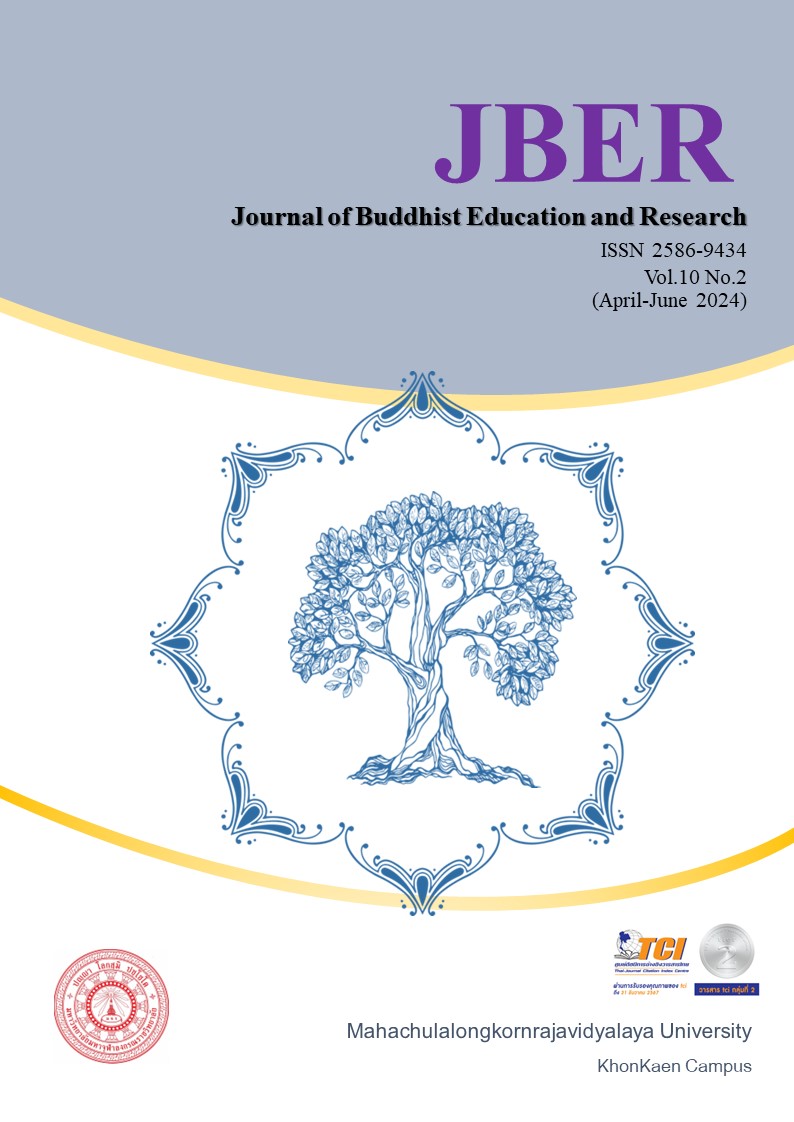THE DEVELOPMENT OF MATHEMATIC LEARNING ACTIVITIES USING ACTIVITY – BASED LEARNING TO ENHANCE SYSTEMS THINKING ABILITY ON THE TOPIC OF PARALLELOGRAMS FOR STUDENTS IN GRADE 5
Keywords:
Systems Thinking, Activity Based Learning, ParallelogramAbstract
The research aims to 1) Study the guideline for learning activities using Activity – Based Learning to enhancing Systems Thinking ability about the topic in Parallelograms and 2) Study the effect of learning activities using Activity – Based Learning to enhancing Systems Thinking Ability about Parallelograms for 5 students in grade 5 in a certain school in the Province of Phrae. Classroom action research was applied by the researcher and the following tools used were activity sheets, reflection forms and systems thinking test. The data were analyzed by content analysis and analytic scoring.
The following findings were as:
- Guidelines for learning activities using Activity – Based Learning to enhance Systems Thinking ability should be emphasized that Step 1: reviewing experiences and stimulating learning, use questions to review previous knowledge. Provide media or activities to attract attention. Step 2: Activity should be activities related to real-life problem situations. And used questions to enhance systems thinking ability. Step 3: Reflection and step 4: Evaluation, used questions to stimulate learning to lead to joint discussion. Step 5: Application. should give advice when students have trouble finding an answer.
- Most students have a high level of systems thinking ability. On which Activity - Based Learning helps develop systems thinking ability.
References
กระทรวงศึกษาธิการ. (2560). ตัวชี้วัดและสาระการเรียนรู้แกนกลางกลุ่มสาระการเรียนรู้คณิตศาสตร์(ฉบับ ปรับปรุง พ.ศ. 2560) ตามหลักสูตรแกนกลางการศึกษาขั้นพื้นฐาน พุทธศักราช 2551. กรุงเทพ: โรงพิมพ์ชุมนุมสหกรณ์การเกษตรแห่งประเทศไทย.
กฤษฎา วรพิน, อรรฆพร วงษ์ประดิษฐ์, สุบิน ยมบ้านกวย และสาธิต จันทรวินิจ. (2565). การเรียนรู้โดยใช้ กิจกรรมเป็นฐานในชั้นเรียนวิชาคณิตศาสตร์. วารสารศึกษาศาสตร์ มหาวิทยาลัยศิลปากร. 20(1), 31-46.
นิยม กิมานุวัฒน์. (2559). การพัฒนารูปแบบการสอนเพื่อพัฒนากระบวนการคิดเชิงระบบสำหรับนักเรียน ระดับมัธยมศึกษา. วารสารศึกษาศาสตร์ มหาวิทยาลัยบูรพา. 27(1), 61-73.
นพคุณ นิศามณี. (2549). การคิดเชิงระบบและความคิดสร้างสรรค์. กรุงเทพ: ศูนย์ผลิตตำราเรียน มหาวิทยาลัยเทคโนโลยีพระจอมเกล้าพระนครเหนือ
ปารมี ศรีบุญทิพย์. (2560). การพัฒนารูปแบบการเรียนรู้เชิงบูรณาการเพื่อเสริมสร้างการคิดเชิงระบบสําหรับ นักเรียนชั้นมัธยมศึกษาปีที่ 1 โรงเรียนสาธิต มหาวิทยาลัยของรัฐ. กรุงเทพ: มหาวิทยาลัยศรี นคริ นทรวิโรฒ.
วิลาวัลย์ โพธิ์ทอง. (2555). เครื่องมือช่วยคิดเพื่อพัฒนาการคิดเชิงระบบ. วารสารศึกษาศาสตร์ มหาวิทยาลัย ศิลปากร. 10(2), 30-42.
สิรินภา กิจเกื้อกูล. (2557). งานวิจัยเชิงคุณภาพ: กระบวนทัศน์ที่แตกต่างและมโนทัศน์ที่คลาดเคลื่อน. วารสาร ศึกษาศาสตร์ มหาวิทยาลัยนเรศวร. 20(1), 272-283.
สำนักงานคณะกรรมการการศึกษาขั้นพื้นฐาน.(2562).แนวทางการนิเทศเพื่อพัฒนาและส่งเสริมการจัดการ เรียนรู้เชิงรุก(Active Learning).
อำนาจ วิชาพล. (2556). ผลของการจัดกิจกรรมการเรียนรู้ที่เน้นการเชื่อมโยงในชีวิตจริง เรื่อง สถิติสำหรับ นักเรียนมัธยมศึกษาปีที่ 3 โรงเรียนนวมินทราชินูทิศเบญจมราชาลัย. วารสารวิจัยราชภัฏพระนคร. 8(2), 81-88.
Çelik, H. C. (2018). The Effects of Activity Based Learning on Sixth Grade Students’ Achievement and Attitudes towards Mathematics Activities. Eurasia Journal of Mathematics, Science and Technology Education, 14(5), 1963-1977.
Senge, P. M. (1990). The Fifth Discipline: The Art and Practice of Learning Organization (1st.). New York: Doubleday/Currency.
R Noreen and AMK Rana. (2019). Activity-Based Teaching versus Traditional Method of Teaching in Mathematics at Elementary Level. Bulletin of Education and Research August 2019, 41(2), 145-159.
Yüksel I. (2014). Impact of activity – based mathematics instruction on students with different prior knowledge and reading abilities. Int J of Sci and Math Educ 12, 1445–1468.
McGrath, Jenny Rebecca. 2011. Linking Pedagogical Practices of Activity-based Teaching. The International Journal of Interdisciplinary Social Sciences, Annual Review 6(3), 261-274.
Downloads
Published
How to Cite
Issue
Section
License

This work is licensed under a Creative Commons Attribution-NonCommercial-NoDerivatives 4.0 International License.





